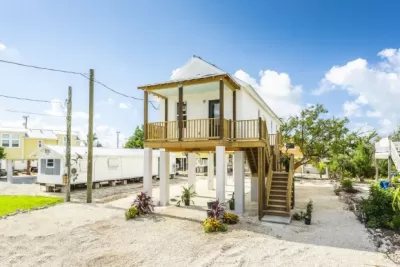A New York Times article explains and, potentially, introduces the community land trust concept, which has proven immensely capable of preventing displacement and foreclosures while advancing homeownership and racial equity.

Michael Friedrich writes about community land trusts as a corrective for skyrocketing housing costs and the displacement of families of color. "By removing land from the speculative market, [community land trusts] keep housing affordable for first-time homeowners — especially low-income people of color," according to Friedrich.
Friedrich exemplifies the potential of land trusts as an avenue to homeownership by examining the Atlanta Land Trust, founded in 2009 during the development of Atlanta BeltLine. "The Atlanta Land Trust focuses on low-income buyers who make between 60 percent and 80 percent of the local median income and can readily support a traditional mortgage," according to Friedrich. "So far, the organization has sold 15 land trust homes; it aims to build 300 by 2025."
According to Friedrich, community land trusts are rooted in the cause of racial equity. "Unlike other types of land trusts, like those formed to conserve land by restricting development, they were devised specifically to prevent the displacement of communities of color," writes Friedrich. In addition to providing a tool for racial equity, community land trusts have been show to lower foreclosure rates and prevent displacement, according to research cited in the article.
The article also describes the scope of the community land trust movement, which can be found in gentrifying neighborhoods around the country in numerous other cities besides Atlanta. The Grounded Solutions Network, for instance, has created a three-city cohort comprising Atlanta, Houston and Portland, Ore. That "shares strategies for acquiring vacant and abandoned land in an effort to scale up the land trust model."
"Encouraged by research on the benefits of community land trusts, Grounded Solutions aims to support the creation of one million new units across the country over the next 10 years," reports Friedrich.
FULL STORY: Affordable Housing Forever

Alabama: Trump Terminates Settlements for Black Communities Harmed By Raw Sewage
Trump deemed the landmark civil rights agreement “illegal DEI and environmental justice policy.”

Planetizen Federal Action Tracker
A weekly monitor of how Trump’s orders and actions are impacting planners and planning in America.

The 120 Year Old Tiny Home Villages That Sheltered San Francisco’s Earthquake Refugees
More than a century ago, San Francisco mobilized to house thousands of residents displaced by the 1906 earthquake. Could their strategy offer a model for the present?

In Both Crashes and Crime, Public Transportation is Far Safer than Driving
Contrary to popular assumptions, public transportation has far lower crash and crime rates than automobile travel. For safer communities, improve and encourage transit travel.

Report: Zoning Reforms Should Complement Nashville’s Ambitious Transit Plan
Without reform, restrictive zoning codes will limit the impact of the city’s planned transit expansion and could exclude some of the residents who depend on transit the most.

Judge Orders Release of Frozen IRA, IIJA Funding
The decision is a victory for environmental groups who charged that freezing funds for critical infrastructure and disaster response programs caused “real and irreparable harm” to communities.
Urban Design for Planners 1: Software Tools
This six-course series explores essential urban design concepts using open source software and equips planners with the tools they need to participate fully in the urban design process.
Planning for Universal Design
Learn the tools for implementing Universal Design in planning regulations.
Clanton & Associates, Inc.
Jessamine County Fiscal Court
Institute for Housing and Urban Development Studies (IHS)
City of Grandview
Harvard GSD Executive Education
Toledo-Lucas County Plan Commissions
Salt Lake City
NYU Wagner Graduate School of Public Service





























